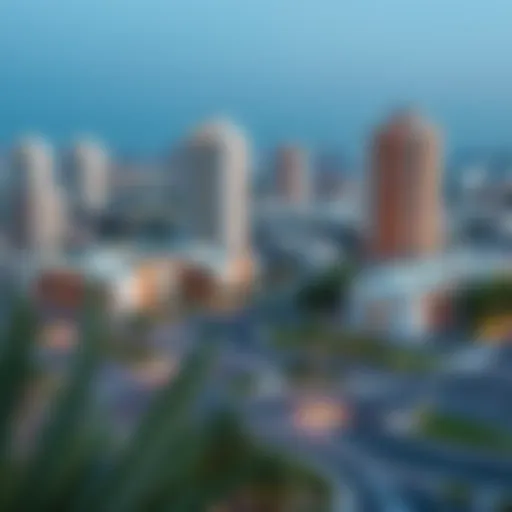Ramadan 2023: Dubai's Cultural and Real Estate Trends
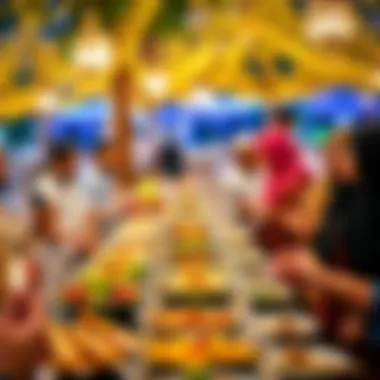
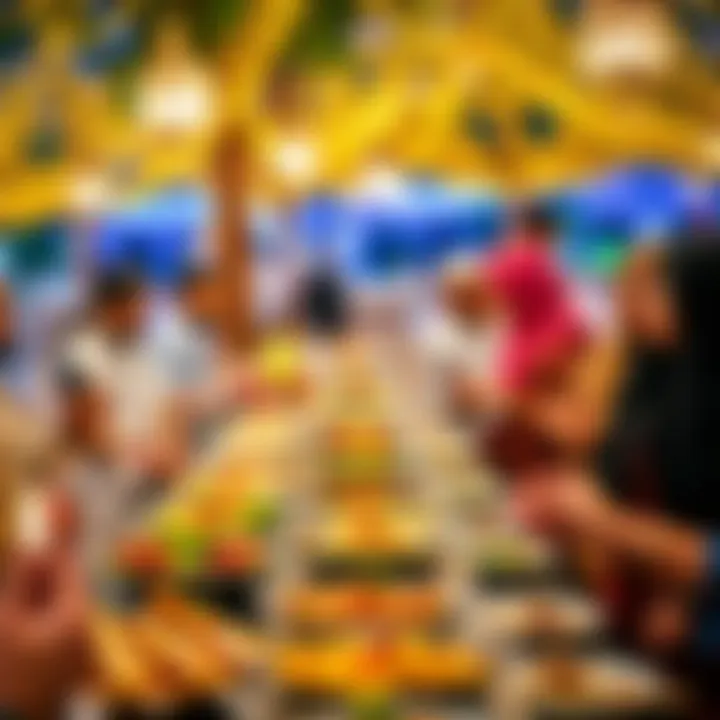
Intro
Ramadan in Dubai is not just a month of fasting; it’s a vibrant blend of spirituality, culture, and even commerce. This holy month, while steeped in centuries-old traditions, brings a unique flavor to the daily life of locals and expats. As the sun sets each day, the city lights up with warmth, community, and a spirit of togetherness. As we journey through the dynamics of Ramadan in 2023, we will explore not only the cultural ramifications but also the tangible influences this time has on Dubai’s real estate market.
In this bustling metropolis, where the skyline is dominated by architectural marvels and the streets are full of life, Ramadan has its own rhythm. The days are marked by reflection and restraint, while the nights transform into lively gatherings with family and friends. Throughout this exploration, we will delve into the subtleties of community engagement, festive customs, and how all these components interact with the real estate landscape.
Understanding these elements provides essential insights for prospective buyers, seasoned investors, and property managers navigating the shifting market during this holy month. Here, we will look closely at the influence of cultural practices on property trends and the community spirit that characterizes Ramadan in Dubai, setting the stage for its impact on both economic and housing behaviors.
With that context established, let’s shed some light on the current market trends and upcoming opportunities that unfold specifically during this time.
Understanding Ramadan
Ramadan is more than just a month; it’s a profound spiritual journey that marks the ninth month of the Islamic lunar calendar. In Dubai, a vibrant melting pot of cultures, understanding Ramadan opens a window to its societal dynamics, reflecting deeply rooted traditions while also shining a light on contemporary shifts. The article navigates through the multilayered aspects of Ramadan, intricately tying its significance to the cultural and economic fabric of Dubai.
By comprehending Ramadan's essence, individuals—be they investors, home buyers, or property managers—can gain insights that inform their decisions during this holy month. Knowledge of Ramadan helps to avoid cultural faux pas and fosters sound relationships within the community. For instance, businesses need to adapt their operating hours to align with cultural observances, while understanding the local iftar traditions can enhance customer engagement.
The stakes are particularly high in a cosmopolitan city like Dubai, where diverse communities celebrate Ramadan in various ways. With a heavy influx of expatriates, recognizing those nuances can serve as a compass for navigating relationships and opportunities in the real estate sector. Understanding Ramadan encourages inclusivity and respect for local customs, which ultimately contributes to a sustainable business model that resonates with the city’s population.
The Historical Context of Ramadan
The origins of Ramadan trace back to 610 CE, when the Quran was first revealed to the Prophet Muhammad. The month serves as a reminder of the struggles of the less fortunate, urging the Muslim community to reflect on charity and compassion. Over the years, customs have evolved while essentials remain intact.
In Dubai, as in many Islamic regions, Ramadan signifies a spiritual renewal. Historically, the month has become intertwined with local customs and has adapted to Dubai’s rapid modernization. From traditional iftars served in community centers to rooftop festivities, these practices celebrate not only the religious significance but also the rich cultural tapestry that characterizes the region. Understanding this context helps investors and buyers gauge the cultural relevance of property locations, particularly those featuring engaging community spaces.
Religious Observance and Practices
For Muslims, Ramadan is primarily about fasting from dawn until dusk, an act of worship intended to purify the soul and promote self-discipline. During this month, daily routines shift considerably, with many people altering their schedules to accommodate fasting practices, which creates a unique rhythm in the city.
- Prayer and Reflection: Most observe the evening prayers known as Taraweeh, encouraging heightened spiritual engagement.
- Iftar: The daily breaking of fast entails communal meals, fostering a sense of togetherness and societal support. In Dubai, luxurious iftar buffets at hotels and restaurants offer not just traditional dishes but also international cuisines, reflecting its multicultural populace.
- Charity: Acts of goodwill intensify during Ramadan, highlighting the zakat principles of giving back to society, making it an ideal time for companies to engage in Corporate Social Responsibility initiatives.
Recognizing these practices enriches one's approach to transacting within this environment—be it property management or community development. As wider communities come together for traditional observances, investing in areas that embrace these gatherings offers potential for long-term gains in residential markets, thus benefiting investors and residents alike.
Dubai's Unique Ramadan Experience
The significance of Ramadan in Dubai extends beyond mere spiritual observance; it intertwines with the city’s vibrant cultural fabric and economic landscape. Known as a melting pot, Dubai showcases an exceptional way to celebrate this holy month, which can serve as an attractive focal point for both investors and potential homeowners. As such, grasping these unique experiences during Ramadan can provide insightful context that informs one’s engagement with both the community and the real estate market.
Cultural Traditions and Celebrations
Ramadan in Dubai is not just about fasting or prayers, it encompasses a rich tapestry of traditions and experiences that engage various segments of the community. One standout aspect is the tent culture, where lavish iftar gatherings take place in beautifully decorated tents. These setups are almost like mini-kingdoms where families, friends, and even strangers gather to break their fast under strings of lights and canopies, creating an ambiance filled with warmth and joy.
Another notable tradition is the cultural events held across the emirate. From live music to art exhibitions that reflect Islamic heritage, many venues, including museums and cultural centers, actively promote activities that engage residents and visitors alike. This creates a dynamic atmosphere that not only emphasizes the spiritual aspect of the month but also fosters community ties and encourages social interaction.
“The cultural richness during Ramadan serves as a bridge between residents and their shared experiences, cultivating a sense of belonging in a diverse population.”
On the business front, the local markets come alive with night bazaars, where unique handicrafts and traditional foods can be enjoyed. Visitors can explore stalls selling regional delicacies and artifacts that make for excellent souvenirs, while simultaneously contributing to the local economy.
Culinary Highlights During Ramadan
Culinary delights take center stage in Dubai during Ramadan, as the city showcases an impressive variety of food offerings. The essence of the month is captured in meals that bring people together. Families eagerly anticipate the breaking of the fast with deliciously prepared meals that typically feature dates and water, followed by hearty soups and savory dishes.
In terms of standout dishes, Al Harees and Shorbat Adas are often served—both carry historical and cultural significance. Al Harees, with its simple preparation of wheat and meat, shines as a symbol of communal spirit, while Shorbat Adas, a lentil-based soup, is cherished for its nourishing properties.
While traditional meals abound, so do contemporary dining experiences. Many restaurants roll out special iftar buffets that showcase global cuisine, providing a feast for the senses. As Dubai is home to diverse culinary traditions, it's not uncommon to find everything from Asian fusion to Middle Eastern classics featured on iftar menus at upscale hotels.
The local food scene becomes a hub of activity, and for those engaged in the real estate market, being aware of trending culinary hotspots can be crucial. Neighborhoods that offer diverse dining options often attract people, thus potentially influencing property values and community dynamics.
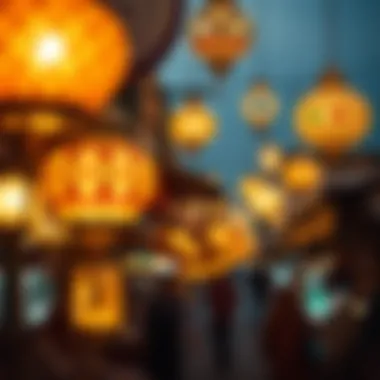
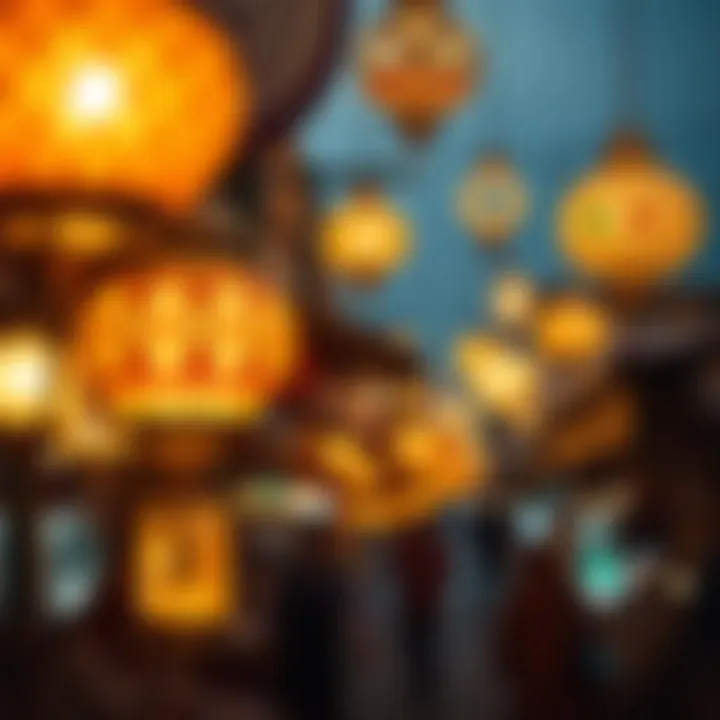
Economic Impact of Ramadan on Dubai
Ramadan’s economic influence on Dubai is significant, shaping the retail and hospitality sectors while also stirring changes in consumer behavior. As the holy month unfolds, each facet of daily life makes subtle shifts that resonate through businesses, real estate markets, and community initiatives. This section will examine how Ramadan fuels the economy and how it could affect the decisions of investors, home buyers, and property managers alike.
Retail Sector and Consumer Behavior
During Ramadan, the retail landscape in Dubai undergoes a transformation that not only reflects cultural observances but also heightens consumer engagement and spending. This period sees a marked increase in foot traffic within shopping malls, as families and friends gather to break their fast and enjoy the festive atmosphere. Major retail players like The Dubai Mall and Mall of the Emirates ramp up their marketing efforts, pulling out all the stops to entice customers with Ramadan-themed promotions and special sales.
Change in buying patterns is notable; people are looking for both essentials and luxuries. As if guided by a communal spirit, shoppers buy not just for themselves but also for their families and friends, increasing the basket size. Many consumers might lean towards purchasing iftar ingredients, ready-meals, and sweets. Stores often stock up on products like dates, juices, and traditional Arabic dishes that become staples during this month.
"Ramadan is a double-edged sword. While it boosts sales, it requires retailers to adapt quickly to new demands and cultural sensitivities."
Mobile applications like noon.com and Carrefour also see a surge as individuals opt for the convenience of online shopping. This growth in e-commerce invites retailers to innovate their services. With the increase in demand happens the challenge of supply chains, producing both opportunity and dilemma for many in the sector.
- Key Takeaways in the Retail Sector During Ramadan:
- Heightened Consumer Engagement: Increased foot traffic and browsing in malls.
- Shifts in Purchasing Patterns: More focus on family meals and traditional foods.
- Growth of E-commerce: Online platforms becoming vital conduits for retail success.
Hospitality Industry Developments
The hospitality sector in Dubai also feels the pulse of Ramadan. Hotels and restaurants design special iftar menus, bringing together familiar tastes and flavors that celebrate the spirit of the month. This culinary offering attracts not just locals but also tourists keen on experiencing Ramadan's rich connections to culture and cuisine.
Notably, establishments such as the Burj Al Arab and Jumeirah Beach Hotel host lavish iftar dinners in breathtaking surroundings. This results in a unique blend of traditional dining fused with luxury hospitality expectations. Many travelers use Ramadan as a reason to visit, drawn by the ambiance and special events held across the emirate. This, in turn, raises occupancy rates during what could be considered a traditionally quieter time of the year for tourism.
The growth in MICE (Meetings, Incentives, Conferences, and Exhibitions) during Ramadan also plays a vital role. Businesses leverage the opportunity to hold events that coincide with the month, using it as a chance to build relationships over iftar gatherings, which leads to long-term partnerships. Hotels equipped with adequate meeting spaces can find themselves booked solid, reaping the rewards of Ramadan’s role in fostering connections.
- Highlights in Hospitality Developments:
- Specialized Iftar Offerings: Unique menus that attract diners.
- Rise in Occupancy Rates: Hotels benefit from increased bookings.
- MICE Opportunities: Corporate gatherings combined with cultural dining experiences.
As the economic landscape shifts during Ramadan, the impacts extend beyond mere numbers. The season influences how businesses operate, how customers engage, and ultimately how the real estate market reflects these trends. Understanding these dynamics allows potential investors and residents to recognize and navigate the ever-evolving landscape of Dubai’s economy during this spiritually rich month.
Ramadan and the Property Market
The interplay between Ramadan and the real estate market in Dubai is a fascinating juxtaposition of culture and commerce. Ramadan is not solely about piety and fasting; it is a period when the rhythm of life in Dubai undergoes significant shifts. This cultural observance deeply influences property demand, making it a crucial aspect for potential buyers and investors to understand. As businesses adapt to the unique dynamics of Ramadan, the real estate landscape reflects these changes, creating opportunities as well as challenges that stakeholders must navigate.
Trends in Property Demand
During Ramadan, there is often a noticeable change in property demand. The surge in family-oriented gatherings, religious activities, and community engagements results in a higher preference for larger living spaces. Flats or villas that accommodate extended families become increasingly popular. Additionally, areas close to mosques or community centers see increased interest, as accessibility to these communal places becomes paramount for those observing the month.
- Many families prefer renting larger spaces to accommodate relatives visiting for Iftar or Suhoor.
- Properties with outdoor spaces or balconies tend to attract attention due to the social aspect of breaking fast outdoors, especially in the pleasant evening weather.
- The tradition of community Iftars promotes properties near these events, as the shared experience is central to Ramadan.
This trend creates an environment where property managers and real estate agents must be attuned to these shifting demands. Awareness of such trends can ultimately influence marketing strategies, lead to successful showings, and culminate in faster transactions.
Investment Opportunities During Ramadan
Ramadan also presents unique investment opportunities in Dubai's property market. Investors should not overlook the potential growth in rental income during this period. As families seek temporary housing for the month, rental rates can often increase.
A few considerations for investors:
- Short-term Rentals: Properties that can cater to tourists or expatriates seeking short stays during Ramadan can yield high returns. Tourist spots, conveniently located leases, or homes with ready amenities for hosting gatherings can boost rental profits.
- Property Development: Offering properties that feature traditional Ramadan elements, such as prayer rooms or designated entertainment spaces, can make them attractive to buyers. Developers enhancing their properties to fit within cultural contexts can find success here.
- Networking Opportunities: Ramadan is a time when networking becomes vital. Real estate seminars and community activities often take place during evenings, creating chances for investors to connect with potential clients or partners.
"Understanding the historical and cultural nuances associated with Ramadan is essential for any real estate professional looking to capitalize on the market during this significant period."
In summary, as Ramadan shapes the social fabric of Dubai, it also reshapes the property landscape. Investors and homebuyers who take note of these trends can not only navigate the market more effectively but can harness tangible opportunities that arise during this unique time.
Community Initiatives During Ramadan
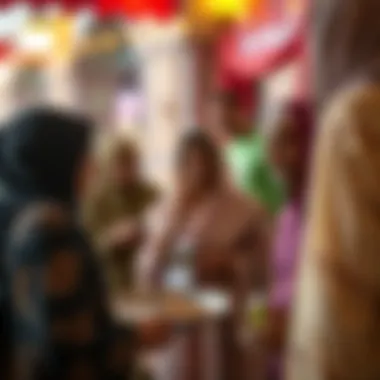
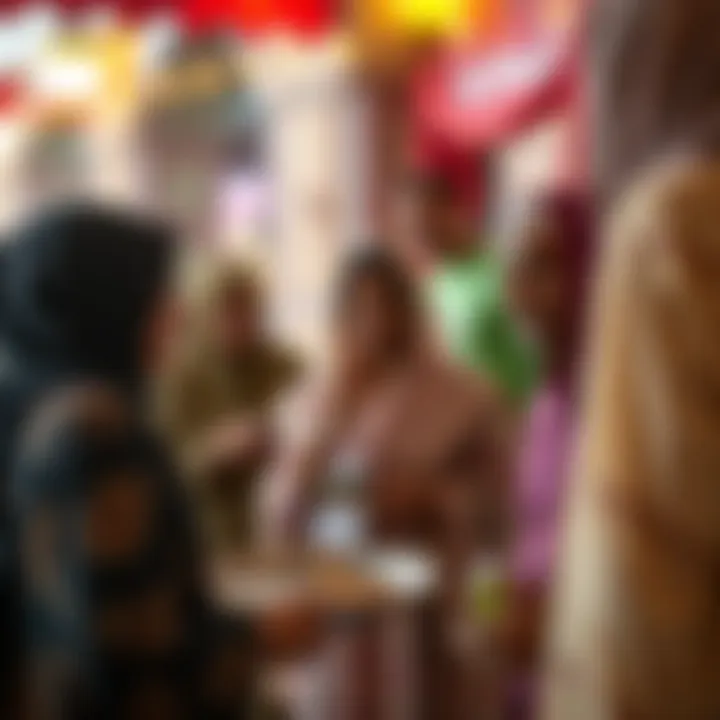
During Ramadan, communities in Dubai engage in various initiatives that reflect the spirit of compassion, generosity, and togetherness. These activities do not only provide support to those in need but also foster a sense of unity among residents, transcending diverse backgrounds. It's crucial to understand how these initiatives shape social dynamics and the local culture during this significant month.
Charitable Activities and Outreach
Charity in Ramadan is more than a nicety—it's woven into the very fabric of the observance. In Dubai, individuals and organizations dedicate their time and resources to help those less fortunate. Popular charities, such as the Dubai Cares and the Red Crescent, ramp up their operations to ensure that essentials reach the needy.
For example, community kitchens or ‘Iftar tents’ spring up across various neighborhoods. These spots provide free meals to anyone who needs them, emphasizing communal spirit. Local mosques often partner with businesses to distribute food packages, especially during breaking the fast at sunset, known as Iftar. The generosity displayed is palpable and often encourages more people to donate, creating a ripple effect of kindness.
Moreover, the youth of Dubai play a major role in these charitable activities. Schools and universities organize fundraisers, and some students even volunteer in distributing meals or clothes. This involvement fosters a sense of responsibility and community spirit that extends beyond Ramadan.
"The essence of Ramadan in Dubai is illustrated in the way communities come together. It’s about camaraderie; everyone is pitching in, and that sense of belonging is invaluable."
Engagement with Local Residents
Engagement with local residents widens the reach and impact of community initiatives during Ramadan. Businesses and local councils often host events aimed at strengthening bonds, such as cultural nights, which showcase arts and crafts, or storytelling sessions for children. Such events not only celebrate local traditions but also invite expatriates to join and share their culinary and cultural heritages.
Additionally, many real estate companies host gatherings that encourage networking among residents. These gatherings can be an opportunity for property managers and investors to connect with locals, discussing interests ranging from community concerns to investment prospects in the real estate sector. These conversations often lead to collaborations that enhance community ties and may stimulate market activity as residents express their housing needs or investment intentions.
In essence, Ramadan creates a unique landscape in which every hand can help create a more harmonious and united Dubai. The varied community initiatives pave the way for cultural exchange and solidarity, reinforcing what it truly means to belong in this vibrant city.
For those looking to participate or be informed about ongoing activities, local resources and social media platforms can be beneficial. Websites like facebook.com, reddit.com or even government sites such as gov.ae can provide up-to-date information on events and volunteer opportunities.
Navigating Daily Life in Dubai During Ramadan
Ramadan is not merely a month of fasting, but a time when the rhythms of daily life in Dubai shift noticeably. For both residents and visitors, understanding these adjustments can help create a smoother and more insightful experience during this holy month. Here, we'll dive into how Ramadan influences daily activities, particularly in terms of work, business hours, and the essential services that keep the city running efficiently.
Adjustments to Work and Business Hours
During Ramadan, many companies in Dubai adapt their work schedules to accommodate the needs of employees observing the fast. Generally, the working hours for most businesses reduce significantly; typically, employees work around six hours a day instead of the traditional eight. This adjustment not only respects the spirituality of the month but also acknowledges the physical demands of fasting.
"Adapting to the rhythm of Ramadan is crucial for maintaining productivity and morale in the workplace."
For instance, larger corporations and government offices may begin working at 9 AM and wrap up by 3 PM, while small businesses could have even shorter hours. This shift encourages a more relaxed pace, allowing employees to focus on their spiritual practices and family commitments in the evenings. A significant aspect to note is that the working environment also shifts; many companies enhance team bonding by hosting Iftar gatherings—these are traditional meals to break the fast, offering a prime opportunity for sharing.
However, for investors and property managers, this can mean a temporary slowdown in business dealings. Decisions regarding real estate investments may be postponed until after iftar as many professionals prefer to discuss significant matters in a more relaxed evening setting. Understanding these cultural nuances can enhance negotiations and partnerships.
Impact on Public Services and Transportation
The effects of Ramadan extend into public services and transportation, reflecting the unique demands of the observance period. For one, local transport schedules adapt to reduce service during fasting hours. Trains, buses, and taxis become significantly busier after sunset as commuters make their way to Iftar gatherings. As such, service providers increase their fleet and adjust routes to accommodate the demand.
Moreover, government offices and health services tend to operate on reduced hours, meaning residents must plan accordingly. Queueing at local service centers may require additional patience, since many people are trying to get their business done before breaking their fast. The shift often leads to increased crowds during later hours when people have more energy.
Even within the realm of public safety, there’s an emphasis on ensuring that fasting citizens and tourists feel comfortable. This sometimes means increased visibility from local law enforcement, patrolling during high traffic times to maintain order and ensure public safety.
The Role of Technology During Ramadan
Technology plays an increasingly integral role in daily life, and during Ramadan 2023, its significance is magnified. Dubai, known for its splendid blend of tradition and modernity, embraces digital solutions to enhance the experience of Ramadan. It’s not just about keeping up with the fast-paced lifestyle; rather, it’s about fostering community spirit while seamlessly managing practical aspects of the month.
From apps that notify users of prayer times to platforms that facilitate charitable donations, technology supports both the spiritual and social elements of Ramadan. This section delves into how tech innovations enhance the observance, making it easier for residents and guests alike to balance their personal routines with the customs of this holy month.
Digital Solutions for Iftar and Suhoor Planning
As the sun sets, families gather for Iftar, the meal that breaks the fast, and Suhoor, the pre-dawn meal. Organizing these meals in a city like Dubai, with its diverse culinary landscape, can be daunting. Here, digital platforms come to the rescue.
Several apps and websites now offer complete solutions for meal planning during Ramadan. Whether it’s reserving tables at popular restaurants or ordering takeout from local favorites, individuals can leverage technology to enhance their dining experience. For instance, platforms like Deliveroo and Talabat present curated lists of Iftar specials, allowing users to explore traditional dishes alongside contemporary favorites.
Moreover, meal prep apps provide users with easy-to-follow recipes that cater not only to different tastes but also to dietary restrictions. This is pivotal for mixing culinary traditions from various cultures, helping to create memorable meals that embody the spirit of sharing and community.
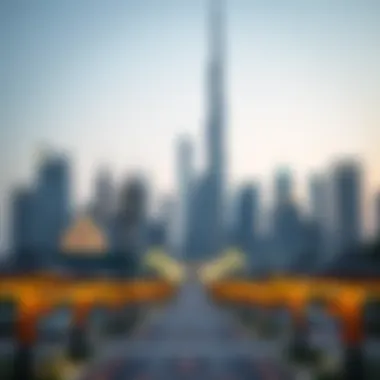
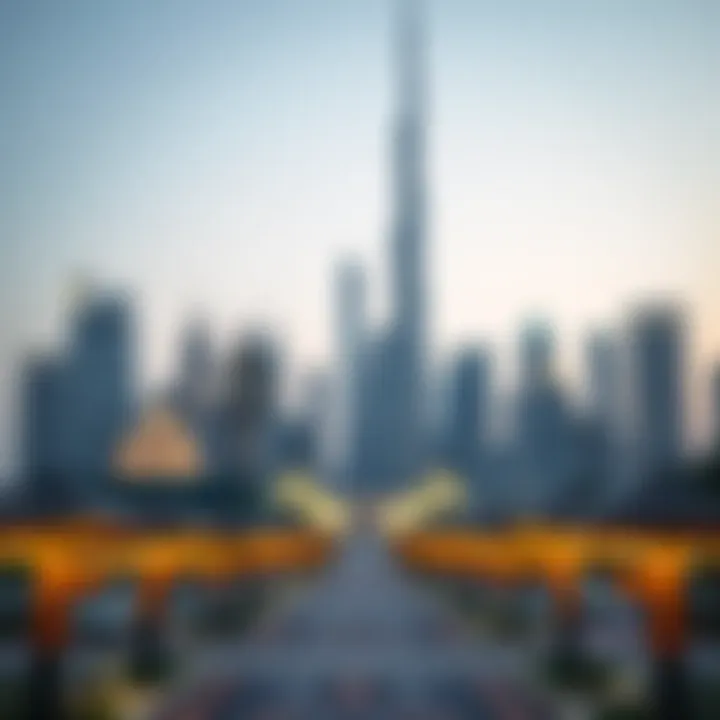
Online Shopping Trends Amid Ramadan
With the advent of e-commerce, Ramadan has also changed the landscape of shopping habits in Dubai. Traditionally bustling markets see a shift as consumers increasingly opt for online solutions, seeking convenience during the holy month's busy evenings.
During Ramadan, many e-commerce platforms ramp up their offerings, featuring limited-time promotions and discounts. For example, websites like Souq.com (now Amazon.ae) and Noon.com often launch special campaigns that cater to Ramadan shoppers. These might include significant reductions on household essentials, gifts, or traditional attire for Eid celebrations.
"In Dubai, online shopping isn't merely a trend; it's a lifestyle tailored to the needs of an ever-busier population during Ramadan."
Furthermore, social media plays a crucial role in influencing buying behavior. Influencers and local businesses harness platforms like Instagram and TikTok to promote Ramadan campaigns, leading to a surge in impulse buys. The interactivity allows people to discover unique products and experience Ramadan’s blend of tradition and modernity in their purchasing choices.
Cultural Exchange and Global Influences
The intricate tapestry of Dubai's cultural landscape during Ramadan is significantly shaped by the city's rich history of cultural exchange and global influences. This melding of traditions paves the way for a unique and enriching atmosphere, especially during the holy month. The very essence of Ramadan in Dubai reflects the interplay of diverse cultures, allowing residents and visitors alike to participate in experiences that transcend mere observance of religious rituals.
When we talk about cultural exchange, it’s not just about sharing customs; it’s about creating a dialogue among communities. This dialogue is particularly potent during Ramadan, as the month is defined by themes of compassion, understanding, and togetherness. Expatriates in Dubai bring their own cultural heritages into the fold, offering a multiplicity of perspectives that enhance the traditional observances found here.
Expatriate Perspectives on Ramadan
Expatriates make up a hefty portion of Dubai's population, and their insights and experiences during Ramadan are vital to understanding the month’s significance in this cosmopolitan environment. Many expatriates approach Ramadan not only as a time of fasting and reflection but also as an opportunity to learn about the host culture and engage in its practices.
- Adaptation and Learning: For many expatriates, celebrating Ramadan involves adapting to local customs and understanding the formality and significance of the practices. They often participate in Iftar gatherings, which break the fast at sunset, allowing them to forge deeper connections with local friends and colleagues.
- Culinary Contributions: The culinary side of Ramadan also offers a great chance for cultural exchange. Many expatriates, keen to partake in the festivities, bring their own flavors to the table, creating an eclectic mix of dishes that can be enjoyed during the Iftar meal.
This shared experience fosters a sense of belonging and community, contributing positively to Dubai's reputation as a melting pot of cultures.
"Ramadan in Dubai becomes a canvas where various cultures paint their unique narratives, creating a rich and vibrant community experience."
Interfaith Engagement and Its Significance
Engagement across faiths during Ramadan showcases the city’s commitment to tolerance and inclusivity. In a region where misunderstandings can arise, Dubai sets a powerful example through interfaith dialogues during this time.
- Community Workshops and Events: Many organizations host workshops aimed at educating people from different backgrounds about the meanings and practices of Ramadan. These events draw participants from various faiths, promoting a cultural exchange that deepens mutual respect.
- Shared Iftar Meals: Interfaith Iftar meals have become a symbol of unity across different religious practices. These gatherings not only serve to break the fast but also to bridge cultural gaps and foster friendships.
- Awareness Campaigns: The significance of Ramadan can also be communicated through social media campaigns that highlight the spirit of giving and understanding during this month. This helps demystify the practices for those unfamiliar, thus promoting empathy and cultural awareness.
Through these routines, Dubai showcases how Ramadan is not just confined to a singular experience; it spills over into a broader narrative where communal ties are strengthened through the acts of sharing, understanding, and mutual respect.
In essence, the intermingling of diverse cultures and religions serves as a powerful antidote to polarization, showcasing the strength found in understanding and respecting each other's differences, especially during this meaningful period.
Looking Beyond Ramadan: Post-Festival Reflections
As the sun sets on Ramadan, its echoes remain woven into the fabric of Dubai's society, altering both cultural and economic landscapes in significant ways. This section takes a moment to reflect on the aftermath of Ramadan, offering insights into its lasting impacts and how they ripple through the densely populated city. The expanse of this holy month extends beyond spiritual observance, deeply influencing real estate trends and cultural practices.
One of the key elements of this reflection lies in understanding that the end of Ramadan does not signify a return to normalcy. Instead, it introduces a transitional phase where new dynamics come into play. For investors and home buyers, it’s crucial to recognize that properties with Ramadan business opportunities may become more sought-after, presenting unique prospects. After the month concludes, the market often sees movements influenced by shifts in buyer sentiment, where demand for residential properties can see a spike as families revamp their living situations post-festival.
In cultural terms, the legacies established during Ramadan contribute to a broader sense of community, creating bonds that transcend mere festive gatherings. People often engage in community initiatives, charity, and neighborly relations during Ramadan, paving the way for stronger ties that persist long after. This sense of togetherness can enhance property values over time as neighborhoods become more desirable due to their reputation for communal support and vibrancy.
> "Understanding the phases following Ramadan can offer keen insights into Dubai’s evolving real estate landscape and community dynamics."
Long-Term Impacts on the Real Estate Sector
The real estate market in Dubai does not operate in isolation; external factors, notably cultural shifts ushered in by Ramadan, carry weight in decision-making processes. After Ramadan, we often witness an uptick in housing demand as families seek to establish homes more conducive to communal living. For investors, this is the golden nugget—areas that showcased festive spirit often see property values rise due to heightened interest from potential buyers.
Several factors contribute to this trend:
- Increased disposable income from festive bonuses. Many employees receive bonuses post-Ramadan as part of company traditions, boosting their purchasing power.
- Demands for family-oriented housing. With gatherings during Ramadan, many participants recognize the need for space and facilities that cater to larger families or groups, prompting searches for homes with flexible layouts.
- Community enhancements. In the wake of Ramadan's charitable spirit, local government often invests in neighborhood improvements, whether in infrastructure or amenities, which further elevates property values.
Real estate agents who are aware of these patterns can position themselves strategically to capitalize on the shifting landscape, bringing valuable offers to their clients.
Cultural Legacies of Ramadan in Dubai
Beyond the realm of real estate, Ramadan leaves a rich tapestry of cultural legacies that continue to shape Dubai's social fabric. Politeness, respect, and an open-door philosophy emerge as hallmark traits that stir from communal observances during this sacred month. Events, such as Iftar gatherings, become institutionalized practices—places equip with tradition and respect help maintain communal harmony.
While many expect traditions to simmer down as Ramadan concludes, the fact is that these cultural norms can influence everyday interactions long after the crescent moon fades. For instance, the practice of sharing meals has instilled a sense of community that many residents carry year-round, impacting social behaviors and interpersonal relationships.
In addition to strengthening community ties, the artistic expressions sprouting from Ramadan also continue to enrich Dubai’s cultural scene. Festivals stemming from Eid al-Fitr burgeon evidence of culinary innovation and new artistic expressions, from contemporary art to traditional music—all echoing collective experiences ranging from the holy month to celebratory moments afterward.











